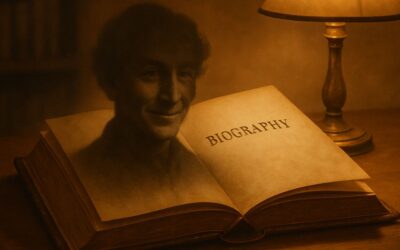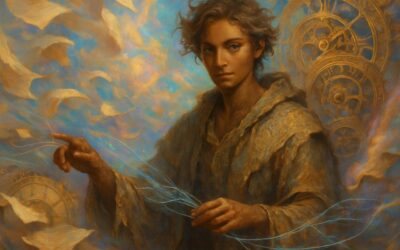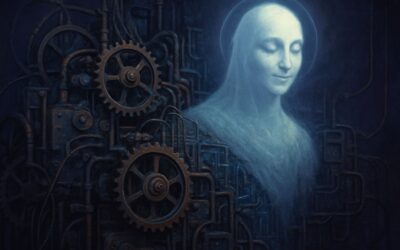A Map of Our Journey
For the past nine episodes, we have been on an incredible journey. We have filled a metaphorical bookshelf with stories from across time and around the world. We began in the dust of ancient Mesopotamia, listening to Gilgamesh rage against the finality of death. We sailed the wine-dark seas with Homer’s heroes and walked the meticulously designed circles of Dante’s Hell. We swam in the cosmic ocean of the Mahabharata, sat with the Tang poets as they drank to the moon, and stood on the universal stage of Shakespeare. We descended into the fevered minds of Dostoevsky’s characters, wandered the magical streets of Macondo with García Márquez, and listened as the lions of Africa finally learned to write their own histories.
We have seen literature serve as a sacred text, a national epic, a political weapon, a psychological laboratory, and a tool for survival. And in our more recent journeys, a powerful theme has begun to emerge: the struggle over identity in a world defined by the collision of cultures. For the writers of Latin America and Africa, telling a new kind of story was a way to reclaim a history that had been buried and to forge an identity that had been denied.
But what happens when that experience—the experience of living between worlds, of having a hyphenated identity, of feeling both connected and displaced—is no longer a regional story, but a global one? In this, our final episode, we look at the world we live in now. A world of constant movement, of digital connection, of blurred borders and blended cultures. We are looking at the literature of the 21st century, a literature that reflects a new, global human condition.
The Unhomely
One of the defining experiences of the modern era is migration. Whether by choice or by force, more people are living in countries other than where they were born than at any other time in human history. This has created a vast global diaspora, communities of people scattered across the world who live with a deep, often complicated, connection to a homeland that may be distant in space or time. This experience of living “in-between” has become a powerful engine for a new kind of literature.
The postcolonial theorist Homi Bhabha called this feeling the “unhomely.” It’s not the same as being homeless. It’s the unsettling feeling that you are a stranger where you live, but you would also be a stranger if you returned to the home you left behind. It’s the feeling of having your identity split across two or more cultures, two or more histories. For the writer, however, this unsettling, “in-between” space can be an incredibly creative and powerful vantage point. From this third space, you can see both the culture you’re in and the culture you’re from with a unique, critical clarity.
The Empire Writes Back… From the Center
For much of the 20th century, this story was often told by writers who moved from the former colonies to the old imperial centers of London, Paris, or New York. The Caribbean, a region forged in the crucible of colonialism, slavery, and migration, produced a generation of writers who transformed English literature from this very vantage point.
The great poet and Nobel laureate Derek Walcott, from the small island of St. Lucia, wrestled with this split identity his entire life. He once wrote, “I who am poisoned with the blood of both, / Where shall I turn, divided to the vein?” His monumental epic poem, Omeros, is a breathtaking answer to that question. He takes the foundational epic of Western literature—Homer’s Iliad and Odyssey—and boldly reimagines it in his own small corner of the Caribbean. The Trojan War is a squabble between local fishermen. Helen is a beautiful housemaid. Achilles and Hector are men who make their living from the sea. Walcott takes the grand classical tradition and claims it, infusing it with the history, the landscape, and the patois of his island. The sea that separates his characters from their ancestral Africa is the same sea that brought the slave ships and the colonizers. As he famously wrote, “The sea is history.”
Weaving New Mythologies: Oceania
A similar process of reclaiming and reinventing narrative has taken place in Oceania, another vast region defined by the legacies of colonialism and the resilience of Indigenous cultures. For decades, the story of Australia was the story of its white settlers. But a powerful wave of Indigenous writers has emerged to tell a much older and more complex story.
The novelist Alexis Wright, from the Waanyi nation in northern Australia, writes fiction that is unlike anything else. Her sprawling, epic novel Carpentaria is a force of nature. It tells the story of a community in the Gulf of Carpentaria, but it does so by weaving together ancient ancestral stories of the Dreaming, searing political commentary on the damage done by a multinational mining company, and a cast of wild, unforgettable characters. Her language is a torrent—playful, furious, lyrical, and challenging. It draws its power not from the traditions of the English novel, but from the deep well of Aboriginal oral storytelling. It is an act of literary sovereignty, a declaration that this land has a story, and its people will be the ones to tell it.
The Screen and the Page
As our identities have become more global and fragmented, so has the very technology we use to tell our stories. The rise of the internet and the smartphone has fundamentally changed our relationship with the written word. We now live in a state of constant, hyperlinked distraction. This has led to a recurring panic: are shorter attention spans killing the novel? Is deep, immersive reading a thing of the past?
Perhaps. But technology hasn’t just been a threat to literature; it’s also been a catalyst for its evolution. New forms have emerged that embrace the digital world. Electronic literature uses the medium as part of the message. There are hypertext novels where you navigate the story by clicking on links, creating your own unique path through the narrative. There are novels written and published in real-time on Twitter, like Jennifer Egan’s “Black Box,” a sci-fi spy story told in a series of 140-character bursts.And then there’s the massive, global, and often overlooked world of fanfiction. On sprawling online archives, millions of readers have become writers, taking the characters and worlds they love—from Harry Potter to Star Trek—and creating their own new stories. It’s a vibrant, participatory literary culture, a kind of digital oral tradition where beloved tales are constantly being shared, remixed, and reinterpreted. It’s a powerful reminder that the desire to not just consume stories, but to inhabit and transform them, is a fundamental human impulse.
Technology has also created a truly global book club. A novel can be published in one country and, thanks to social media platforms like TikTok, become a worldwide bestseller overnight. The old gatekeepers of the literary world are finding their power diminished as readers connect with each other and with authors directly, creating a global conversation that transcends borders.
What is “World Literature”?
This interconnectedness has given new life to the idea of “World Literature.” The term doesn’t just mean “all the literature from all the countries in the world.” It’s more about a mode of circulation and a mode of reading. A book becomes world literature when it travels beyond its original culture and speaks to a global audience. The engine of this process is, and has always been, translation. Translators are the unsung heroes of world literature, the crucial bridge-builders who allow stories to cross the borders of language.The quintessential “global novel” of the 21st century is often one that has migration and hybrid identity baked into its very DNA. These are books that feel at home everywhere precisely because they are about the feeling of not being at home anywhere.
The Pakistani-British author Mohsin Hamid writes novels that are perfect examples of this. His book Exit West tells the story of a young couple, Saeed and Nadia, who are forced to flee their war-torn city. But instead of a grueling, realistic journey, they escape through a series of mysterious, magical doors that can transport them in an instant to a new part of the world—from their home to a Greek island, to London, to California. By using this single, fantastical element, Hamid strips away the mechanics of the journey to focus on the universal, emotional experience of being a refugee: the disorientation, the loss, and the challenge of building a new life in a new place.
The Polish Nobel laureate Olga Tokarczuk created a novel called Flights that embodies the form of our globalized world. It’s not a book with a single plot. It’s a “constellation novel,” a brilliant collection of hundreds of fragments: short stories, historical anecdotes, anatomical lectures, philosophical musings, and the travel notes of a narrator who is always in motion. The book is about travel, about the human desire to move, and about the connections we find in unexpected places. Its very structure—fragmented, digressive, and interconnected—mirrors the way we experience life in the digital age.
The Unfinished Bookshelf
And so our journey ends here, in the present, on the shores of a vast and ever-expanding ocean of stories. We began with the first scribe, a person who decided a story was so important it needed to be fixed in clay, to be saved from being forgotten. We end in an age where a billion people can share a story with the click of a button. The technology has changed almost beyond recognition, but the human impulse at its core remains the same.
We tell stories to make sense of the world and our place in it. We tell stories to remember where we came from and to imagine where we might go. We tell stories to feel less alone, to connect with the ghosts of the past and the strangers of the present, to understand what it feels like to be someone else. Literature is our collective memory, our shared consciousness, our instruction manual, our warning label, and our book of common prayer. It is the grand, chaotic, contradictory, and glorious story of us.
This series was called “The Story of Literature,” but of course, it’s a story with no end. The global bookshelf is not a finished collection; it’s a living, growing thing. At this very moment, somewhere in the world, a new voice is writing a new chapter. A new story is being born that will challenge our assumptions, break our hearts, and change the way we see the world. Our journey is over. But the bookshelf is infinite. The story never ends. Keep reading.
List of Episodes in the Series
The Story of Literature EP1 | The First Scribes: Tales from the Fertile Crescent
The Story of Literature EP2 | Echoes of Olympus: The Greek and Roman Foundations
The Story of Literature EP3 | The Ocean of Stories: Epics and Wisdom of South Asia
The Story of Literature EP4 | The Brush and the Sword: Poetry and Philosophy in East Asia
The Story of Literature EP6 | Forging a Continent: From Beowulf to the Enlightenment
The Story of Literature EP7 | The Soul of the Steppe: The Great Russian Psychological Novel
The Story of Literature EP8 | Magic and Memory: The Boom of Latin American Literature
The Story of Literature EP9 | The Griot’s Legacy: Oral Traditions and Post-Colonial Voices of Africa
The Story of Literature EP10 | The Global Bookshelf: Migration, Identity, and the 21st-Century Story










0 Comments